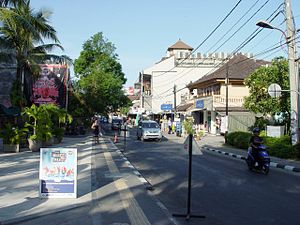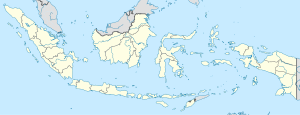Kuta(Fishing Destination)
| Kuta | |
|---|---|
| Kuta mainstreet | |
| Coordinates: 8°44′S 115°10′E / 8.733°S 115.167°E | |
| Country | Indonesia |
| Province | Bali |
Kuta is administratively a district (kecamatan) and subdistrict/village (kelurahan) in southern Bali, Indonesia.[1] A former fishing village, it was one of the first towns on Bali to see substantial tourist development, and as a beach resort remains one of Indonesia's major tourist destinations. It is known internationally for its long sandy beach, varied accommodation, many restaurants and bars, and many renowned surfers who visit from Australia. It is located near Bali's Ngurah Rai Airport.
Kuta was the site of the October 12, 2002 1st Bali bombing (202 killed) and the October 1, 2005 2nd Bali bombing (26 killed).
The Balinese Provincial Government have taken the view that the preservation of the Balinese culture, natural resources and wildlife are of primary importance in the development of the island. To this end they have limited tourist development to the peninsula on the extreme southern aspect of the island; Kuta beach is on the western side of this peninsula and Sanur is on the east. To the north of the peninsula no new tourist development is supposedly permitted.[citation needed].
To the south, Kuta Beach extends beyond the airport into Jimbaran. Other nearby towns and villages include Seseh (6.4 nm), Denpasar (4.5 nm), Ujung (1.8 nm), Pesanggaran (2.0 nm), Kedonganan (2.9 nm) and Tuban (1.0 nm).
Administration
Kuta District (Indonesian:Kecamatan Kuta) covers subdistricts/villages (Indonesian:Kelurahan/Desa) of Kuta Village, Legian, Seminyak, Kedonganan, and Tuban. Furthermore Badung Regency has 3 districts with the name Kuta: Kuta, Kuta South District Kecamatan Kuta Selatan (Jimbaran and the whole Nusa Dua peninsula), and Kuta North District Kecamatan Kuta Utara (villages of Kerobokan Klod, Kerobokan, Kerobokan Kaja, Tibu Beneng, Canggu and Dalung).
Kuta is now the center of an extensive tourist-oriented urban area that merges into the neighboring towns. Legian, to the north, is the commercial hub of Kuta and the site of many restaurants and entertainment spots. Most of the area's big beachfront hotels are in the southern section of Tuban.
Legian and Seminyak are northern extensions of Kuta along Jl. Legian and Jl. Basangkasa. They are somewhat quieter suburbs with cottage-style accommodations, where many of the expat crowd live. Also to the north are Petitenget, Berawa, Canggu, and Seseh — new and quieter continuations of Kuta's beach. They are easy to reach through Abian Timbul or Denpasar and Kerobokan. Several large hotels are located in this area: the Oberoi Bali, Hard Rock Hotel Bali, the Intan Bali Village, the Legian in Petitenget, the Dewata Beach and the Bali Sani Suites in Berawa.
Bali bombing memorial
After the first Bali Bombing in 2002 at Kuta, a permanent memorial was built on the site of the destroyed Paddy's Pub on Legian Street. (A new bar, named "Paddy's: Reloaded", was reopened further along Legian Street.) The memorial is made of intricately carved stone, set with a large marble plaque, which bears the names and nationalities of each of those killed. It is flanked by the national flags of the victims. The monument is well-maintained and illuminated at night.
The memorial was dedicated on 12 October 2004, the second anniversary of the attack. The dedication included a Balinese Hindu ceremony and the opportunity for mourners to lay flowers and other offerings. The Australian ambassador and Indonesian officials attended the ceremony as most of the victims were Australians.
The Balinese mark their commitment in a nine-day long event. After major cleansing ceremonies, establishing a memorial for the lost lives, and paying respect to those who left loved ones behind, the people of Kuta look forward to restoring Bali’s image through an event named "Kuta Karnival — A Celebration of Life”. The community event consists of traditional art performances such as Balinese Sunset Dances, sports on the beach as well as in the water for young and old plus rows and rows of culinary displays along the one kilometre of sandy beach.
In line with the return of tourism to Kuta, Kuta Karnival has grown into a tourism promotional event with major coverage from television and newspapers from across the globe. Companies, embassies, Non-Government Organizations, associations and even individuals come forth to get involved in the various events such as a Balinese dance competition presented by a surf-wear company, an environment exhibition presented by an embassy, a fun cycle presented by a group of individuals, a seminar presented by an association and a parade on the streets presented by an NGO. Tourists and locals alike, more than ninety thousand people participates in the numerous events, year after year.
A repeated tragedy in Bali in 2005 did not reduce the Kuta community’s determination to carry out this annual event. Kuta Karnival is conducted to commemorate and give respect to the victims of human violence and show the world the true spirit of local community survival despite terrorism attacks.
Wall of Kuta Beach
Costing Rp.4 billion ($0.47 million), a two-meter white sandstone fence was built along the road to block the sand from blowing to the cafes and restaurants, so tourists cannot see the white sandy beach of Kuta while they walk along the road or sit in the nearby cafes. Some tourists dislike it as it is considered ruining the beach view, while some others believe the wall help dampens the sounds from the congested traffic street.[2] To make the beach cleaner, as of late August 2011, the vendors are prohibited to sell food at the Kuta Beach, but they are still allowed to sell beverages and souvenirs.[3]
In popular culture
Kuta is mentioned in "I've Been To Bali Too", the single by Australian folk-rock band Redgum from their 1984 album Frontline.








No comments:
Post a Comment